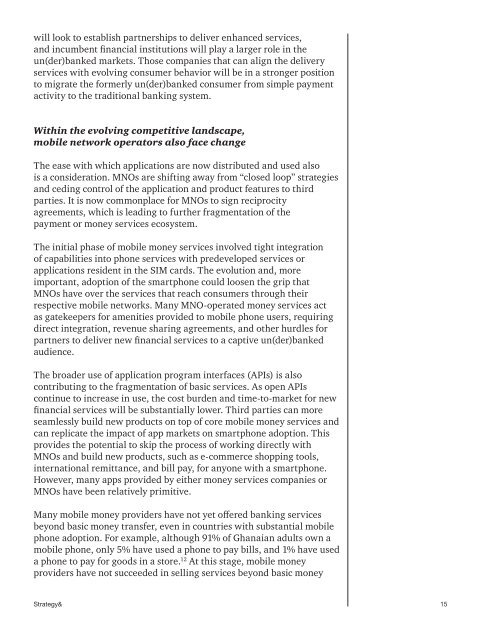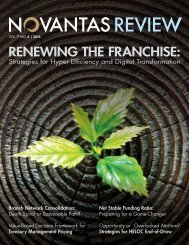The un(der)banked is FinTech’s largest opportunity
DeNovo-Quarterly-Q2-2016.pdf?utm_content=buffer9dd60&utm_medium=social&utm_source=twitter
DeNovo-Quarterly-Q2-2016.pdf?utm_content=buffer9dd60&utm_medium=social&utm_source=twitter
You also want an ePaper? Increase the reach of your titles
YUMPU automatically turns print PDFs into web optimized ePapers that Google loves.
will look to establ<strong>is</strong>h partnerships to deliver enhanced services,<br />
and incumbent financial institutions will play a larger role in the<br />
<strong>un</strong>(<strong>der</strong>)<strong>banked</strong> markets. Those companies that can align the delivery<br />
services with evolving consumer behavior will be in a stronger position<br />
to migrate the formerly <strong>un</strong>(<strong>der</strong>)<strong>banked</strong> consumer from simple payment<br />
activity to the traditional banking system.<br />
Within the evolving competitive landscape,<br />
mobile network operators also face change<br />
<strong>The</strong> ease with which applications are now d<strong>is</strong>tributed and used also<br />
<strong>is</strong> a consi<strong>der</strong>ation. MNOs are shifting away from “closed loop” strategies<br />
and ceding control of the application and product features to third<br />
parties. It <strong>is</strong> now commonplace for MNOs to sign reciprocity<br />
agreements, which <strong>is</strong> leading to further fragmentation of the<br />
payment or money services ecosystem.<br />
<strong>The</strong> initial phase of mobile money services involved tight integration<br />
of capabilities into phone services with predeveloped services or<br />
applications resident in the SIM cards. <strong>The</strong> evolution and, more<br />
important, adoption of the smartphone could loosen the grip that<br />
MNOs have over the services that reach consumers through their<br />
respective mobile networks. Many MNO-operated money services act<br />
as gatekeepers for amenities provided to mobile phone users, requiring<br />
direct integration, revenue sharing agreements, and other hurdles for<br />
partners to deliver new financial services to a captive <strong>un</strong>(<strong>der</strong>)<strong>banked</strong><br />
audience.<br />
<strong>The</strong> broa<strong>der</strong> use of application program interfaces (APIs) <strong>is</strong> also<br />
contributing to the fragmentation of basic services. As open APIs<br />
continue to increase in use, the cost burden and time-to-market for new<br />
financial services will be substantially lower. Third parties can more<br />
seamlessly build new products on top of core mobile money services and<br />
can replicate the impact of app markets on smartphone adoption. Th<strong>is</strong><br />
provides the potential to skip the process of working directly with<br />
MNOs and build new products, such as e-commerce shopping tools,<br />
international remittance, and bill pay, for anyone with a smartphone.<br />
However, many apps provided by either money services companies or<br />
MNOs have been relatively primitive.<br />
Many mobile money provi<strong>der</strong>s have not yet offered banking services<br />
beyond basic money transfer, even in co<strong>un</strong>tries with substantial mobile<br />
phone adoption. For example, although 91% of Ghanaian adults own a<br />
mobile phone, only 5% have used a phone to pay bills, and 1% have used<br />
a phone to pay for goods in a store. 12 At th<strong>is</strong> stage, mobile money<br />
provi<strong>der</strong>s have not succeeded in selling services beyond basic money<br />
Strategy&<br />
15




